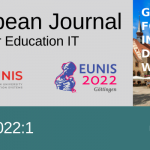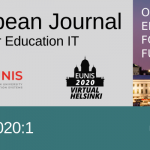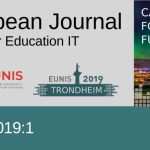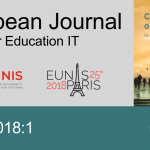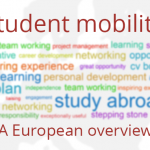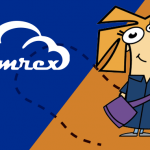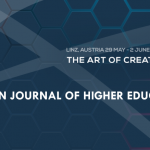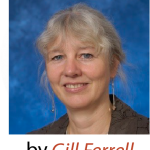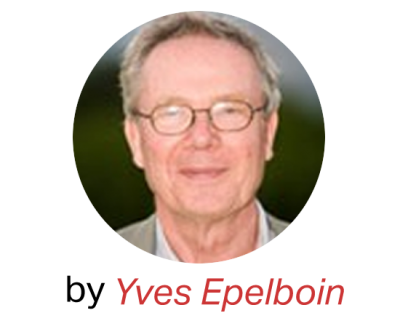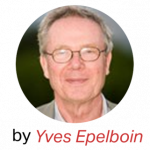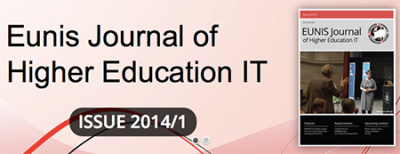EUNIS Journal of Higher Education IT – EJHEIT
This 2014/1 Issue of Eunis Journal of Higher Education IT is the first of a number of issues that publishes full papers from the EUNIS congress. This issue focuses on papers from the track “Supporting teaching and learning”.
ISSN 2409-1340
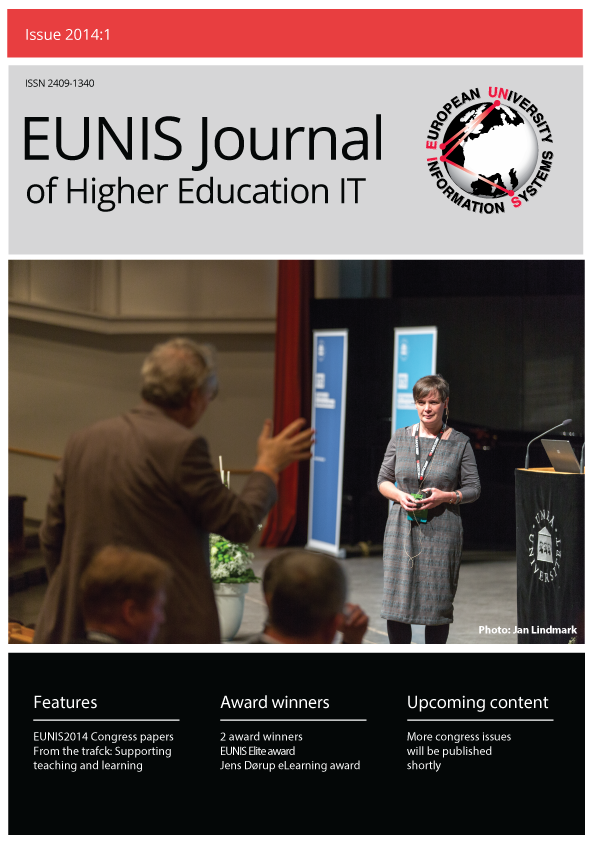
Supporting teaching and learning
This congress special Issue of the Eunis Journal of Higher Education IT focuses on papers coming from the eLearning track, Supporting teaching and learning, of the annual congress.
The track contained several good presentations and papers. There were not only papers with a focus on the technical aspects of eLearning or the mooc revolution which, if we assume the congress as a thermometer, no longer is as vibrant as it was a few years ago but also pedagogical aspects of eLearning.
5 papers were shortlisted for the Jens Dørup eLearning Award and the winner was “Technology in real life teaching of distributed software development”.
The runner up was “Networked teaching. The story of a success on creating e-learning content at Universitat Politècnica de València”
THE IMPORTANCE OF STUDENT’S COLLABORATION IN THE IMPROVEMENT OF NEW LEARNING ENVIRONMENTS
Maria Lopes Pinto, Eva Marques and Luis Valente
Abstract
THE IMPORTANCE OF STUDENT’S COLLABORATION IN THE IMPROVEMENT OF NEW LEARNING ENVIRONMENTS
Maria Lopes Pinto (mariapinto@reit.up.pt), Eva Marques (evamasmarques@gmail.com), Luis Valente (lvalente@reit.up.pt)
In face of the geographic distribution of its premises within the city of Porto and to its decentralized model of governance,U.Porto developed a strategy to reinforce cohesion, the sharing of resources and services. Information and Communication Technologies (ICT) plays a major role on this strategy. The need to create new and innovative places were students andfaculty can socialize and engage in studying activities, promoting the interdisciplinary, exchange of knowledge and experience is one of the successful aspect of the strategy.
The contribution of the e-learning café of U.Porto and the successful implementation of its program, focused on diversepedagogical and cultural activities, to the acquisition of students’ attitudes and skills essential to handle professionalrelationships and to facilitate learning, personal development and entrepreneurship, is now of main importance for manyhigher education students.
We intend to present the successes of the outcomes of student’s involvement to solve a specific problem, having in mind theoffer of a better service to the users of the e-learning café and facilitate the work of the students’ team that work at thespace.
DIGITAL DIDACTICAL DESIGNS: RE-IMAGINING DESIGNS FOR TEACHING AND LEARNING
Isa Jahnke, Andreas Olsson, Anders Norberg and Lars Norqvist
Abstract
DIGITAL DIDACTICAL DESIGNS: RE-IMAGINING DESIGNS FOR TEACHING AND LEARNING USING MEDIA TABLETS
Isa Jahnke (isa.jahnke@umu.se), Andreas Olsson (andreas.olsson@umu.se), Anders Norberg (anders.norberg@skelleftea.se), Lars Norqvist (lars.norqvist@umu.se)
The approach of Digital Didactical Designs offers a new thinking for planning, doing and reflecting on teaching and learning. It uses the European tradition of Didaktik and scrutinizes teaching and learning as socially constructed forms of social practices. Results from our empirical research in Denmark and Sweden (higher education) point to teaching practices that attempts to change from traditional course-based learning into learning expeditions where the implementation of educational technology, in particular media tablets, is the lowest common denominator but still not the main focus for re-imagining old and new designs for teaching and learning.
TECHNOLOGY SUPPORTED ASSESSMENT AND FEEDBACK: TACKLING THE ISSUES OF PEDAGOGOY, PROCESS & PEOPLE
Gill Ferrell, Andrew Stewart
Abstract
TECHNOLOGY SUPPORTED ASSESSMENT AND FEEDBACK: TACKLING THE ISSUES OF PEDAGOGY, PROCESS & PEOPLE
Gill Ferrell (gill.ferrell@northumbria.ac.uk), Andrew Stewart (a.stewart@northumbria.ac.uk)
This paper reflects on the outcomes of the Jisc Assessment and Feedback programme (Sept 2011-Aug 2014) which exploredlarge-scale changes in assessment and feedback practice, supported by technology. Assessment and feedback lies at theheart of the learning experience yet student surveys in the UK show that it remains the single biggest source of studentdissatisfaction with the higher education experience as well as posing increasing problems in terms of staff workload due to ever increasing class sizes.
A paper to EUNIS 2013 ‘Supporting assessment and feedback practice with technology: a view of the UK landscape’discussed some of the new tools and approaches used in the UK; this paper looks at whether the secret to getting the mostout of the available technologies lies in tackling issues related to pedagogy, process or people.
MAKING EXAMINATIONS MORE VALID, MEANINGFUL AND MOTIVATING: THE ONLINE EXAMS SERVICE AT ETH ZURICH
Tobias Halbherr, Kai Reuter, Daniel Schneider, Claudia Schlienger and Thomas Piendl
Abstract
MAKING EXAMINATIONS MORE VALID, MEANINGFUL AND MOTIVATING: THE ONLINE EXAMS SERVICE AT ETH ZURICH
Tobias Halbherr (tobias.halbherr@let.ethz.ch), Kai Reuter (kai.reuter@let.ethz.ch), Daniel Schneider (daniel.schneider@let.ethz.ch), Claudia Schlienger (claudia.schlienger@let.ethz.ch), Thomas Piendl (thomas.piendl@let.ethz.ch)
This paper provides a comprehensive overview of the institution-wide online exams service at the Swiss Federal Institute ofTechnology (ETH) Zurich. It is intended for stakeholders in faculty, administration, IT, and didactic support units who wish topromote and implement a similar service at their own institutions. Based on pedagogical and psychometric considerations, a case is made for how online exam environments can help to improve the quality of examinations in higher education bymaking performance assessments more accurate and valid, as well as more motivating and meaningful to students.Throughout the subsequent outline of the online exams service at ETH, we focus on identifying the elements critical tofulfilling these aims. This includes a discussion of the organization, development, and operation of the service and thedidactic and technical support for examiners. We provide blueprints of our online exam setups, and demonstrate how evencomplex online exam environments incorporating a mix of applications, files and websites can be made secure. The paperfinishes with a discussion and an outlook regarding our current and planned service development projects.
MOOC 2014: SHOULD UNIVERSITIES ENTER THE COMPETITION?
Yves Epelboin
Abstract
MOOC 2014: SHOULD UNIVERSITIES ENTER THE COMPETITION?
Yves Epelboin (yves.epelboin@impmc.upmc.fr)
No one university can ignore the MOOC phenomenon. Although it is rapidly falling down along the Gartner Hype curve it will definitively influence the ways of teaching. But before jumping into the development of costly resources universities should define their objectives and thoroughly consider what does means going in this direction.
We will categorize the possible interests of a MOOC, for an institution, and then consider the needed resources, which must be, assemble before making the decision. A MOOC is a project for a full team, not for a single academic and this means coordination, human resources as well as a technical environment. A thorough investigation of all the requirements is mandatory before making any decision.
BLOWING BACKWARDS INTO THE FUTURE OF ICT IN EDUCATION?
Anders Norberg, Isa Jahnke
Abstract
BLOWING BACKWARDS INTO THE FUTURE OF ICT IN EDUCATION?
Anders Norberg (anders.norberg@skelleftea.se), Isa Jahnke (isa.jankhe@umu.se)
In this paper, we want offer a new radical thinking of education in the digital age. By applying a critical approach and scrutinizing existing concepts of ICT in education, it is time for re-imagining and re-designing teaching ways and learning processes across space and time.
EUNIS ELITE AWARD WINNER
TRANSFORMING THE STUDENT EXPERIENCE: MANCHESTER METROPOLITAN UNIVERSITY’S EQAL PROJECT
Mark Stubbs
Abstract
TRANSFORMING THE STUDENT EXPERIENCE: MANCHESTER METROPOLITAN UNIVERSITY’S EQAL PROJECT
Mark Stubbs (m.stubbs@mmu.ac.uk)
In 2010, with top level support and direction from its Deputy Vice Chancellor, Manchester Metropolitan University(MMU) set up the EQAL Programme – “Enhancing Quality and Assessment for Learning”. The goal was to make a step-change improvement in student satisfaction by refreshing the entire undergraduate curriculum whilst simultaneously reengineeringadministrative processes and creating a seamless personalised experience that wrapped the university’s information andonline resources around each learner. The ambitious deadline was to deliver a brand new, technology-supported first yearfor September 2011 with the new second year starting September 2012 and the new final year September 2013.
The scale and pace of the project was unprecedented for the UK Higher Education sector, but it delivered on time andproduced significant improvements in MMU’s scores for student satisfaction in national league tables. Study information from across the university is aggregated for every student using web services, and presented in a Moodle VLE and freesmartphone App. Every undergraduate had a personal timetable and a personal assignment and examination calendar.Moodle receives over
50 million hits a year and over 27,000 students have registered for the smartphone App. Students have embraced thetechnology as a two way communication channel with over 10,000 providing over 40,000 comments for tutors each year onthe best things about their course and the things they would like to see improved. Consistent use of tags and identifiers usedto deliver personalized information is enabling sophisticated learner analytics to provide business intelligence todrive improved student retention, satisfaction and success.
DØRUP AWARD SHORTLISTED PAPER
ONLINE GAME-ENHANCED TEACHING IN GAME THEORY
Sonia Badeau-Mahmoud, Regis Deloche and Thierry Koscielniak
Abstract
ONLINE GAME-ENHANCED TEACHING IN GAME THEORY
Sonia Badeau-Mahmoud (sonia.badeau@parisdescartes.fr), Regis Deloche (regis.deloche@parisdescartes.fr), Thierry Koscielniak (thierry.koscielniak@parisdescartes.fr)
Introducing digital educational games into class lessons can generate engagement, interactivity, and motivation. It can also result in an active participation of the students in the classroom.
To achieve this goal, one teaching strategy is to use online digital games in teaching and learning situations. In our case, we wanted to test this strategy in an economics course, especially in a Game Theory lesson.
We set up an experiment in two different lessons: the “Economie expérimentale” (Experimental economics) lesson with L3 students and the “Introduction à l’analyse économique du droit” (Introduction to law economics analysis) with M2 students.
For these two experiments we decided to use an online n-player “Chicken” game, proposed on the free educational games website Economics Games, http://economics-games.com (Gruyer and Toublanc, 2013).
Our paper will present these innovative experiments carried out in economics courses about Game Theory at Paris Descartes University. It will also explore the pedagogical and motivational value of online economics games on student learning in economics education and especially in Game Theory teaching.
DØRUP AWARD RUNNER-UP
NETWORKED TEACHING, THE STORY OF A SUCCESS ON CREATING E-LEARNING CONTENT AT UNIVERSITAT POLITÈCNICA DE VALÈNCIA
Carlos Turro, Ignacio Despujol and Jaime Busquets
Abstract
NETWORKED TEACHING. THE STORY OF A SUCCESS ON CREATING E-LEARNING CONTENT AT UNIVERSITAT POLITÈCNICA DE VALÈNCIA
Carlos Turró (turro@cc.upv.es), Ignacio Despujol (ndespujol@asic.upv.es), Jaime Busquets (busquets@asic.upv.es)
At year 2006, the strategic plan of the Universitat Politècnica de Valencia created an initiative, called Networked Teachingaimed to encourage the production of high quality e-learning materials as a companion material for the standard lectures.Since then, the combination of teachers, technical and pedagogical resources has produced more than 10,000 video learningobjects, from more than 1,400 teachers, 1,200 virtual labs, 3200 hours of recorded lectures, 120 OpenCourseWare sites and 41MOOCs, leaving the UPV brand as a top participant in the Spanish Speaking e-learning scene. A key factor in the UPV strategyis the combination of flexibility for the teachers, technical standardization and the requirement of pedagogical review, whichmakes the produced content reputable for the use both for individuals and for any Higher Education institution.
DØRUP AWARD SHORTLISTED PAPER
TOOL FOR CREATING LEARNING MODULES DEVELOPED ON THE BASIS OF OPEN SOURCE OPENSCHOLAR SOFTWARE
Lehti Pilt, Tõnis Tartes and Triin Marandi
Abstract
TOOL FOR CREATING LEARNING MODULES DEVELOPED ON THE BASIS OF OPEN SOURCE OPENSCHOLAR SOFTWARE
Lehti Pilt (lehti.pilt@ut.ee), Tõnis Tartes (tonis.tartes@ut.ee), Triin Marandi (triin.marandi@ut.ee)
The article deals with developmental work of Sisu@UT tool (https://sisu.ut.ee) for creating learning modules developed on the basis of free open source OpenScholar software project. The tool enables the creation of interactive learning modulesthat support all the stages of the learning process and help students to achieve learning outcomes. Teachers of theUniversity of Tartu can experience web- based cooperation when using the tool. The main functionalities of OpenScholarsoftware and some integrated modules/plugins (quiz, webform and glossary module, multiple content editor and popupplugins) are introduced. Sisu@UT tool contains many other custom developments to the core of OpenScholar required to beused effectively in e-learning. These include the addition of metadata, site categories, developed custom themes andincluded Drupal’s Sweaver editor.
Sisu@UT (that has received very positive feedback from its users) is the only free open source software which enables to addand change interactive features online inside the same web site/learning module. It makes the management of learningmodules easier and less time consuming than other similar offline tools or online tools that do not enable to add interactiveelements.
DØRUP AWARD SHORTLISTED PAPER
INTERACTIVE LECTURES WITH MOODLE AND STUDENTS’ DEVICES: BYOD AT PARIS DESCARTES UNIVERSITY
Sonia Badeau-Mahmoud, Antoinette Bouziane, Ludivine Alvarez, Marion Harent, Jennifer Carmichael, Xavier Coumoul and Thierry Koscielniak
Abstract
INTERACTIVE LECTURES WITH MOODLE AND STUDENTS’ DEVICES: BYOD AT PARIS DESCARTES UNIVERSITY
Sonia Badeau-Mahmoud (sonia.badeau@parisdescartes.fr), Antoinette Bouziane (antoinette.bouziane@parisdescartes.fr), Ludivine Alvarez (ludivine.alvarez@parisdescartes.fr), Marion Harent (marion.harent@parisdescartes.fr), Jennifer Carmichael (jennifer.carmichael@parisdescartes.fr), Xavier Coumoul (), Thierry Koscielniak ()
ICT for Education has the potential to enhance and support learning. It is now possible to create engaging environments for learning and teaching and especially supporting interactive lectures.
To achieve this goal one strategy is to implement BYOD (Bring Your Own Device) programs into the learning process. The acronym BYOD refers to “[…] technology models where students bring a personally owned device to [university] for the purpose of learning.” (Alberta Education, 2012).
This definition confirms that using BYOD can indeed be an innovative way to create and animate interactive lectures.
This paper will present the learning activities based on the Moodle LMS (http://moodle2.parisdescartes.fr/) that were carried out in different lectures on a BYOD mode. It will also show how this model can improve and enhance learning and impact students’ motivation.
DØRUP AWARD WINNER
TECHNOLOGY IN REAL-LIFE TEACHING OF DISTRIBUTED SOFTWARE DEVELOPMENT
Ivana Bosnić, Mario Žagar and Ivica Crnković
Abstract
TECHNOLOGY IN REAL-LIFE TEACHING OF DISTRIBUTED SOFTWARE DEVELOPMENT
Ivana Bosnić (ivana.bosnic@fer.hr), Mario Žagar (mario.zagar@fer.hr), Ivica Crnković (ivica.crnkovic@mdh.se)
Distributed Software Development course is a project-based course, currently run together on three universities: in Croatia,Italy and Sweden. The specificity of this course is usage of technology and distance work in order to teach students exactlythat – distributed software development. Students experience what they are learning about through course participation.The goal is to offer students real-life experience of building such a distributed project, by working in distributed teams,having teaching staff and customers in remote universities, or participating in software competitions. Different educationalactivities build on the social constructivism method of learning, supported by various tools and technologies used. Courseevaluation, which is being conducted since the beginning, for 11 years, shows constant and high students’ satisfaction.Students’ comments acknowledge the innovative concept and an opportunity to work in a real-life, distributed environment, with the help of technology.

